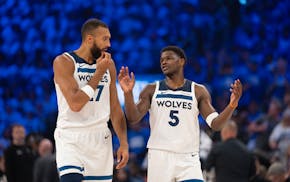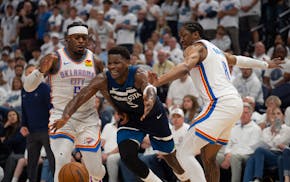There are two kinds of baseball thinkers who use the term "analytics" — those who spend time in big-league clubhouses, and those who don't.
Because the rise of baseball analytics was oversimplified and dramatized by Michael Lewis' book "Moneyball," there was a time when "analytics" supposedly meant discounting the human element in the game. Because if you can't place a number on leadership, does it even exist?
The Twins should return to the playoffs this season. If they do, Nelson Cruz and the people who signed him should receive a large percentage of the credit, in part because Cruz has been a productive hitter, in part because he has been an ideal influence on a young team.
"I believe that Nelson Cruz has had a tremendous impact on some of our up-and-coming leaders," General Manager Thad Levine said. "His game preparation is close to unparalleled. Which makes sense. You don't continue to play the game at age 39 at this level without being prepared.
"Two of the major things he's brought to this team are meticulous preparation to his pregame routine and emotional expression during the game. He promotes working hard before the game and enjoying yourself during the game. He encourages guys to play with emotion, and to let the opponent and the fans know that we're out there having fun winning baseball games. I can't tell you how important those approaches are to our team."
Levine worked in the Rangers' front office when Cruz played for Texas. He knew what the Twins were getting in Cruz. What's stunning is the price tag at which they got him.
This winter, Bryce Harper signed with the Phillies for 13 years and $330 million. His OPS (on-base-plus-slugging percentage) is .839. Manny Machado signed with the Padres for 10 years and $300 million. His OPS is .828.
Cruz signed for one year and $14.3 million. His OPS is .921.
Harper and Machado play the field and are young, so they could prove valuable over time. But Cruz provided an immediate infusion of maturity and perspective into a clubhouse lacking both, and the Twins can bring him back next year for $12 million.
That he is bilingual, on a team filled with important, young, Latin American players, is an important bonus.
"I think he and Marwin Gonzalez have had a real impact on the team," Levine said. "Nelson's ability to mentor across cultures is significant. Not to say you can't do that if you're not bilingual, but I think there's a level of connection and communication that he can deliver that not everyone can."
Cruz even led Levine and Chief Baseball Officer Derek Falvey to see their team in a new light. The Twins believed they were competing with Tampa Bay and Houston, among others, for Cruz.
"We weren't sure, candidly, whether we were going to have to overpay relative to a team like Houston because the perception was that they were farther along in the winning cycle," Levine said. "His agent said pretty emphatically that Nelson thought we had every chance of making the playoffs that Houston did.
"Honestly, that's one of the first times we looked at each other and said, 'Should we enhance our sense of self-confidence relative to 2019?' We thought we were moving in the right direction, but comparing ourselves to Houston, given what the Astros had accomplished, was not something we were doing internally."
Cruz also has given manager Rocco Baldelli a proven No. 3 hitter.
"He's gotten a lot of 'smart' singles for us," Levine said. "He's been what we feel has been an All-Star caliber DH, a steady presence in the middle of our order, an important figure in our clubhouse, has taken pressure off some of our younger hitters, has been a run producer and a table setter and has quietly proven to be one of our more astute baserunners."
And they signed him at a price that allowed them to land other key free agents, which is why the Twins have the division lead and a clubhouse that knows how to work and play.
Jim Souhan's podcast can be heard at TalkNorth.com. On Twitter: @SouhanStrib. • jsouhan@startribune.com

Souhan: Will the Wolves trade for Kevin Durant? Should they?

Souhan: If Edwards is a franchise player, he needs to act and play like it

Souhan: Wolves' weak performance in Game 5 invites change, so don't let it shock you

Souhan: Edwards and Randle flop in the Timberwolves' biggest game of the season



